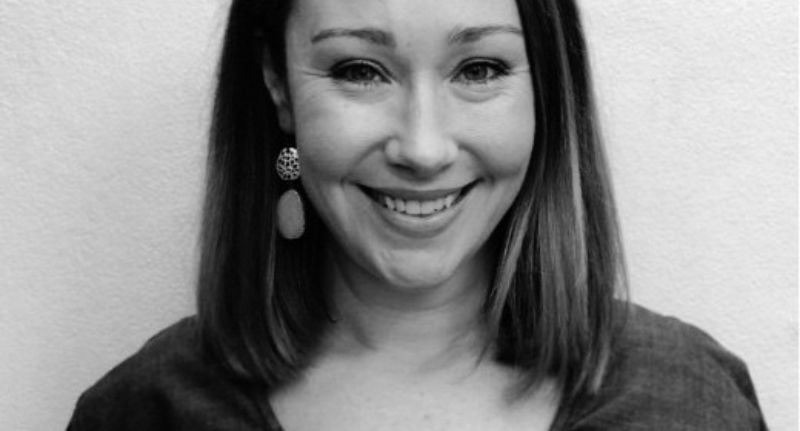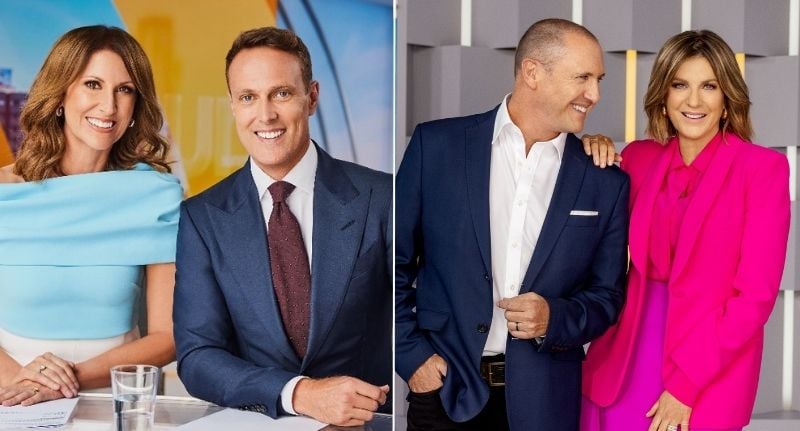The Seven Network has maintained its stranglehold on Australian morning television in 2025, with Sunrise, Weekend Sunrise and The Morning Show all finishing every week of the year so far at #1.
Now, Mediaweek has gone behind the scenes with Jake Lyle, Executive Producer of Sunrise, and Chloe Flynn, Executive Producer of The Morning Show, to learn what keeps the shows at the top of the breakfast and morning slot year after year.

(L-R) Sunrise EP Jake Lyle alongside hosts Natalie Barr and Matt Shirvington.
Jake Lyle, Executive Producer, Sunrise
Mediaweek: You’ve been with Sunrise for just over 18 months. Still, you’ve inherited a breakfast show with 22 years of dominance. How do you contribute to evolving the format without disrupting a formula that’s working?
Lyle: The success of Sunrise has been built on years of hard work from an incredible group of people, and it’s important to keep those foundations in place to maintain strong results. But as we know, the landscape is changing fast, and if you’re not constantly adapting and innovating, you’ll get left behind.
Mediaweek: When a program has such a long lead over competitors, is the bigger challenge innovation… or avoiding complacency?
Lyle: We’re grateful to our audience for tuning in every day and putting us in the position we’re in, but you’ll never hear us popping the champagne. It’s a constant hustle. We’re always thinking of new ways to improve.
Mediaweek: What’s your process for deciding what leads the program each morning? How do you balance breaking news, live crosses, and lighter lifestyle or entertainment segments?
Lyle: It comes back to what we think is the most important thing to our viewers, and making sure they get the most important and up-to-date information to kick off their day.
In terms of a process (with our instant coffees in hand) the team and I will sit over the morning newspapers, overnight police reports, and the latest from our overseas bureaus to build that bulletin.
The important thing is to be ready for anything, and to be fully prepared to throw out the rundown and start from scratch if major news breaks.
Mediaweek: How do you ensure the show’s personality-driven moments feel authentic rather than manufactured?
Lyle: You can’t fake a real moment, and if you try the audience will see straight through you. Spontaneity is one of the greatest things about live TV. Whether it’s a quirky guest, a slip up on a script, or a story you didn’t think was going to make you cry. It’s what makes a show like Sunrise so great. But it’s not something you can plan for or manufacture.
Mediaweek: Rival breakfast programs have tried multiple format changes over the years to close the gap. What’s your read on why Sunrise’s formula continues to resonate where others have faltered?
Lyle: I reckon it’d be a mistake to assume there’s a ‘winning formula’, or that we’ve figured it out, but at the end of the day it comes down to the content, how it’s delivered and who’s delivering it.
Mediaweek: Looking ahead, what do you see as the next significant disruption to breakfast television, and how is Sunrise preparing for it?
Lyle: I’d love to look into a crystal ball and see what the next few years of TV looks like, but we’re just doing our best to prepare for anything.
We’ve already started to adapt.
Just this month we kicked off an Australian TV first, with a TikTok livestream from behind the scenes of the show, at the same time Sunrise was broadcasting live on air.
There’s a lot of talk about AI throwing a spanner in the works, but when that happens, it’s industries that focus on human connection that will become more important.

The Morning Show EP Chloe Flynn
Chloe Flynn, Executive Producer, The Morning Show
Mediaweek: Eighteen years at #1 is extraordinary. What’s the secret sauce that keeps The Morning Show not just relevant, but dominant in a market where audience attention is splintering?
Flynn: At 18, the show is finally entering adulthood! But like any teenager coming of age, we may look a little different (and have a few mood swings thrown in for good measure), but our core is fundamentally the same.
I think it’s striking that balance of keeping pace with changing viewer habits and interests, while protecting the essence of the brand, that gives audiences the reassurance that while we’re reliable and trusted, we’re not stagnant.
Mediaweek: You stepped into the EP role in 2022. How has your leadership style evolved the format without alienating the loyal audience?
Flynn: Leadership absolutely begins with having the right team in place, and I’m privileged to work with a talented group of people who all bring something unique to the table.
Secondly, we foster an environment that encourages creativity and collaboration, debate and discussion, but it’s up to me to be very clear on the identity and direction of the show so that everyone can operate within defined parameters.
Morning television is habit-driven, so it’s important for any changes to be gradual and feel organic, rather than coming in and overhauling everything just for the sake of it. I like to think of it as a bit of botox here and there rather than going in for the complete facelift.
Mediaweek: In a ratings climate where fluctuations are common, what’s your approach to maintaining consistency week in, week out?
Flynn: Ratings are important, but they can also be a distraction.
When you’re first starting out, it’s easy to jump at shadows and question your decisions based on one bad ratings day, when realistically, there’s a whole host of reasons why that could’ve happened, not just the story you decided to put at 9.43am.
I think as a leader it’s important to stay focused on the bigger picture and trends, so that you can navigate through the more challenging times and focus on what’s coming next rather than yesterday’s performance.
Mediaweek: Breakfast and morning television have faced competition from streaming, social media, and on-demand news: How do you keep live morning TV compelling enough for audiences to tune in in real time?
Flynn: As a live programme, we have a unique ability to tell people what’s happening in real time, a lot can and does happen in the three hours we’re on air.
But while there are many positives to the huge volume of choice we have in our viewing habits nowadays, the flip side is information paralysis, a lot of people are overwhelmed by the amount of content out there, and rely on trusted brands like ours to curate and dissect everything into a more digestible format.
But morning TV isn’t just about delivering information, it’s also about feeling.
Mediaweek: How do you identify and react quickly to trending topics or viral moments without feeling like you’re chasing clicks?
Flynn: Realistically, looking at what’s viral or trending is a fairly good barometer for the zeitgeist, but we need to take it a step further. I always think of it as the “so what?” factor. Just because someone has a gazillion TikTok followers, doesn’t mean our viewers will care about an interview with them.
Is it an interesting backstory? Is it just a visually-interesting piece? Is it something that’s entertaining? Or is it simply something that the whole world is talking about and we really want to know what the fuss is about so they can make their own mind up?
